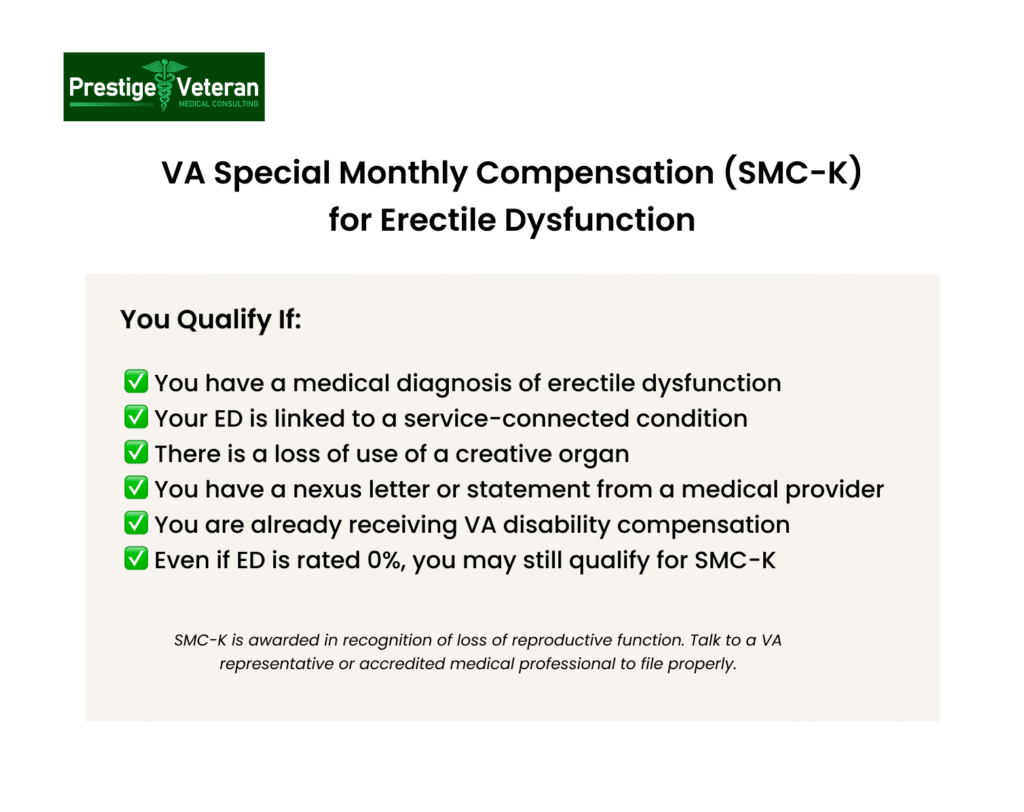For many veterans, the impact of military service extends beyond the battlefield. One condition that quietly affects a significant portion of the veteran population is Erectile Dysfunction (ED), a sexual dysfunction that can influence confidence, relationships, and overall well-being. A national study found that 14.2% of male military veterans reported erectile dysfunction, linked to various physical and mental health conditions.
In this blog, learn how the VA rates erectile dysfunction, how veterans can qualify for VA disability, and what compensation you may be entitled to under Special Monthly Compensation (SMC-K).
Table of Contents
What is Erectile Dysfunction?
Erectile Dysfunction (ED) refers to the persistent or recurring inability to achieve or maintain an erection firm enough for sexual activity. While occasional difficulties are common, ED becomes a medical concern when it consistently interferes with sexual performance.
Veterans are particularly vulnerable to ED due to both physical and psychological factors stemming from military service. Combat-related trauma, prolonged stress, exposure to hazardous environments, and rigorous physical demands can lead to a range of health complications, including ED.
Causes and Symptoms in Veterans
Physical causes of erectile dysfunction include diabetes, cardiovascular disease, high blood pressure, obesity, low testosterone, prostate issues, and spinal injuries.
Psychologically, mental health conditions like PTSD, anxiety, and depression frequently lead to sexual dysfunction.
Medications prescribed to many veterans (e.g., SSRIs for PTSD or beta-blockers for hypertension) are known to cause or exacerbate ED.
Symptoms of erectile dysfunction may often include:
- Trouble achieving or maintaining an erection
- Decreased sexual desire
- Anxiety or depression surrounding sexual performance
- Relationship difficulties due to reduced intimacy
Erectile Dysfunction can deeply affect a veteran’s self-esteem, relationships, and overall quality of life. Recognizing this, the Department of Veterans Affairs (VA) allows qualified veterans to seek VA compensation for ED, particularly when linked to service-connected disabilities.
Is Erectile Dysfunction a Recognized VA Disability?
Yes, the Department of Veterans Affairs acknowledges erectile dysfunction as a disability, particularly when it is a result of or related to a service-connected condition. However, ED is typically not rated on its own with a compensable percentage unless it involves specific physical impairments or conditions.
The VA will evaluate ED claims in several ways to include:
- As a secondary condition caused or aggravated by an already service-connected disability.
- Through specific diagnostic codes (7520–7524) that relate to damage or deformity of reproductive organs.
- Via Special Monthly Compensation (SMC-K) for the loss of use of a creative organ (reproductive capability).
Even if erectile dysfunction is rated at 0%, you might still qualify for monthly compensation through Special Monthly Compensation (SMC-K).
Service Connection for Erectile Dysfunction
To qualify for VA disability compensation, a veteran must establish that their erectile dysfunction is service-connected. This means proving that ED either began during military service or is directly linked to a service-related injury, illness, or exposure.
There are two primary routes to establish a service connection:
1. Direct Service Connection
This occurs when ED results directly from an in-service event, exposure, or injury. For example:
- An injury to the pelvic or groin area during active duty
- Military sexual trauma (MST)
- Exposure to toxins or chemicals during military service (e.g., Agent Orange)
2. Secondary Service Connection
Most veterans qualify through a secondary connection, meaning ED developed or aggravated by an already service-connected disability, such as PTSD, diabetes, or side effects from medications.
For a successful erectile dysfunction VA claim, veterans must provide:
- A current medical diagnosis of erectile dysfunction
- Documentation of evidence showing an in-service event, illness, or injury linked to the condition
- A nexus statement (an independent medical opinion) from a qualified healthcare professional linking the ED to military service or a service-connected condition
Veterans can strengthen their case with buddy statements, service medical records, and sometimes with physician-signed nexus letters. These documents are critical in helping the VA understand the full scope of how service has affected sexual health.
VA Ratings for Erectile Dysfunction
For VA disability claims, ED is rated under Diagnostic Code 7522, titled “Erectile dysfunction, with or without penile deformity.” In most cases, veterans diagnosed with ED are awarded a 0% rating, which means they are not eligible for monthly disability pay through the regular VA schedule. However, this non-compensable rating still recognizes the condition as service-connected, opening the door to Special Monthly Compensation (SMC).
Since erectile dysfunction does not have its own specific rating schedule, the VA evaluates it under diagnostic codes of the genitourinary system, which are tied to physical injuries or deformities.
Below is a table showing the relevant Diagnostic Codes within the VA’s Schedule for Rating Disabilities (38 CFR § 4.115b) used to evaluate erectile dysfunction and related conditions:
| Diagnostic Code | Description | Rating | Monthly Compensation |
| 7520 | Partial removal of the penis | 30% | $537.42 |
| 7521 | Removal of the glans (head of the penis) | 20% | $346.95 |
| 7522 | Deformity with loss of erectile power | 20% | $346.95 |
| 7523 | Atrophy of both testicles | 20% (0% if one testicle) | $346.95 |
| 7524 | Removal of both testicles | 30% (0% if one testicle) | $537.42 |
Hence, VA ratings for erectile dysfunction due to physical injuries and deformities can range from 0%, 20%, to 30%, depending on its severity and how it affects the veteran’s daily functioning. These associated Diagnostic Codes (7520–7524) may lead to a higher rating or make your non-compensable ED a compensable rating.
Following a service-related injury, Veteran James experienced a severe penile deformity that made sexual intercourse impossible. Under Diagnostic Code 7520, involving partial removal of the penis, he was awarded a 30% disability rating for erectile dysfunction and now receives $537.42 in monthly compensation.
Special Monthly Compensation (SMC-K) for ED

Special Monthly Compensation – K (SMC-K) is a unique benefit provided to veterans who have experienced the loss of use of a creative organ, including the inability to reproduce due to ED. SMC-K for erectile dysfunction is awarded in addition to any other VA disability compensation the veteran is already receiving.
Facts About SMC for Erectile Dysfunction:
- It adds to your existing VA compensation
- In 2025, the SMC-K provides $136.06/month, an amount adjusted annually based on cost-of-living increases.
- You qualify even if your ED rating is 0%
- You must prove loss of use of a creative organ (e.g., inability to engage in sexual intercourse, infertility, etc.)
For example, even if a veteran uses medications like Viagra or Cialis to manage primary or secondary symptoms or had a vasectomy before developing ED, they can still qualify for SMC-K as long as the condition is service-connected.
Special Monthly Compensation (SMC) is a separate benefit and not based on your primary VA disability rating. That means, even if you are rated at 100% for another service-connected condition, you can still receive SMC-K.
Erectile Dysfunction as a Secondary Condition
Many veterans experience ED not as an isolated condition but as a secondary effect of other service-connected disabilities. In fact, secondary service connection is the most common way ED becomes eligible for VA compensation, even when it is not directly caused by military service.
Common service-connected conditions that can cause or worsen secondary ED:
- PTSD and Depression: Both PTSD and depression disrupt hormone levels and neurological function, significantly affecting libido and sexual performance. Moreover, medications like SSRIs often list ED as a side effect. Studies show that up to 85% of male veterans with PTSD also experience erectile dysfunction.
- Sleep Apnea: Disrupted sleep, oxygen deprivation, and hormonal imbalances linked to sleep apnea can contribute to ED.
- Diabetes Mellitus – High blood sugar can damage nerves and blood vessels critical for erections, making ED a common in men with poorly managed or long-term diabetes.
- Spinal Cord Injuries – Impact nerve communication between the brain and reproductive organs. Back injuries, especially in the sacral or lower lumbar region, can impair sexual reflexes and erectile function.
- Hypertension & Heart Disease – Impairs circulation, a major factor in erectile function.
- Prostate Cancer or Surgery: Veterans treated for prostate cancer or benign prostatic hyperplasia (BPH) may develop ED due to nerve or tissue damage.
- Medication Side Effects – Drugs for depression, anxiety, or blood pressure can reduce sexual desire or performance.
The VA allows secondary claims if you can demonstrate that ED is “proximately due to or aggravated by” a primary service-connected condition. To support this type of claim, a nexus letter from a qualified medical professional is often required, clearly linking the primary condition to the secondary condition (ED).
VA C&P Exam for Erectile Dysfunction
The VA Compensation & Pension (C&P) exam for Erectile Dysfunction is a critical step in securing service-connected disability benefits and proving your eligibility for Special Monthly Compensation (SMC-K).
Examination Process
Initiated by the VA, this exam typically begins with a review of your medical records or a request for an in-person evaluation. Many ED-related exams are conducted as ACE (Acceptable Clinical Evidence) reviews, meaning no in-person visit is required if documentation is sufficient.
However, if there are questions about physical abnormalities or unclear medical history, a physical examination conducted by a VA-contracted physician or clinician may be scheduled. Veterans always have the option to decline the physical portion if they are uncomfortable.
During the C&P exam, the examiner fills out the Disability Benefits Questionnaire (DBQ) for Male Reproductive Organ Conditions. This form documents your diagnosis, date of symptoms onset, medical history of infections or tumors, any related conditions, and how the ED affects your daily life. Veterans will also be asked about their medical history, current symptoms, and treatments to manage the sexual dysfunction.
Most importantly, this exam helps determine whether your ED is “at least as likely as not” related to your service or a secondary condition.
How to Prepare Thoroughly
- When preparing for the exam, ensure you submit clear documentation, including medical records, doctor’s notes connecting ED to another condition, and buddy statements from a spouse or partner describing the impact as applicable.
- Answer honestly on how the condition affects your sexual health, psychological well-being, and relationships.
- Lastly, be ready to discuss your symptoms openly, as C&P exam results can significantly improve your chances of receiving a favorable VA rating for ED.
How to Get VA Disability Benefits for Erectile Dysfunction
Veterans experiencing sexual dysfunction due to their military service may be eligible for VA disability benefits and compensation if they provide the right evidence and follow the correct process. Understanding what documents to submit when filing a VA claim can make the journey much smoother.
Here are important considerations for a successful ED VA claim:
1. Establish a Service Connection
To qualify for VA disability for erectile dysfunction, you must prove a direct or secondary link to your time in service. This can include direct causes like a physical injury, or secondary causes such as depression, hypertension, prostate surgery, sleep apnea, or medications prescribed for service-connected conditions.
2. Secure a Medical Diagnosis
The VA requires a current, documented diagnosis of erectile dysfunction from a VA or private healthcare provider. Include urology reports, medication history, and treatment records. VA will not approve claims based on symptoms alone. Having documented, ongoing ED treatment strengthens your case.
3. Request a Strong Nexus Letter When Applicable
Obtain a nexus letter written by a licensed medical provider explicitly stating: “It is at least as likely as not that the veteran’s erectile dysfunction is caused or aggravated by [service-connected condition].” This nexus opinion links ED to your existing disability, which is vital for secondary service connection. It is important to remember that while a nexus is always required, it does not have to be in the form of a nexus letter from an external source. If there is enough evidence for the VA to order a C&P examination, they will request a medical opinion, or nexus consideration. This does not mean it will be positive, but they will request one at no cost to the claimant.
4. File Your Claim When Ready
Use VA Form 21-526EZ to apply online at VA.gov, by mail, in-person, or with the assistance of a Veteran Service Officer (VSO). Include relevant medical records, nexus letters, and spouse’s statements to enhance the claim.
5. Attend a C&P Exam
Once you have filed your erectile dysfunction claim, VA may request a Compensation & Pension (C&P) exam to confirm your diagnosis and determine your eligibility for VA benefits. This exam evaluates male reproductive organ conditions (VA Form 21-0960J-2). If there’s no penile deformity, the examiner may rely on medical records instead of a physical exam.
6. Look out for SMC-K Compensation
While ED usually gets a 0% VA rating, veterans can still qualify for Special Monthly Compensation (SMC-K) for loss of use of a creative organ, which offers about $130 per month tax-free. You don’t require a compensable rating to get SMC-K compensation.
7. Seek VSO Assistance
Don’t hesitate to seek assistance from Veterans Service Organizations (VSOs) like DAV, VFW, or American Legion that offer free help with VA claims, appeals, and gathering supporting evidence. Their expertise can make the difference between VA claim approval and denial.
Common Challenges and How to Appeal
Unfortunately, many initial VA claims for erectile dysfunction are denied due to insufficient evidence or lack of a valid service connection. Fortunately, veterans have several options to move forward and strengthen their case:
If your ED claim is denied, you can (According to VA’s Appeals Modernization Act)
- Request a Higher-Level Review – This involves a more experienced VA reviewer taking a second look at your claim. No new evidence is considered, but they will reassess the original application for errors or overlooked details.
- File a Supplemental Claim – You can add new, relevant information to support your supplemental VA claim. This might include updated medical evaluations, a more detailed nexus letter, or additional service records.
- Appeal to the Board of Veterans’ Appeals (BVA) – If you choose this route, you can request a direct review with no new evidence, submit new documentation for the Board to consider, or schedule a hearing with a Veterans Law Judge to present your case in person.
Hiring a VA-accredited attorney or veterans service officer (VSO) can significantly improve your chances, especially if your case involves complex medical links or multiple conditions.
Additional VA Benefits for Veterans with ED
In addition to SMC-K, veterans with ED may be eligible for several other VA benefits:
- VA Healthcare Coverage: Free prescription medications like sildenafil (Viagra) or tadalafil (Cialis) if the condition is service-connected.
- Mental Health Counseling: For conditions like PTSD or depression contributing to ED.
- Adaptive Equipment: Vacuum erection pumps or penile implants in severe cases.
- Family Therapy or Support Services: Through VA social work, sex therapy, or marriage counseling programs.
Access to these benefits helps improve quality of life, restore intimacy, and address the psychological impact of sexual dysfunction.
Final Thoughts
Erectile dysfunction can be a deeply personal challenge, especially for veterans coping with the lasting effects of service. While the VA rating system may seem complex, understanding your options and pursuing the right documentation can make a real difference. Remember, even if your condition receives a 0% rating, Special Monthly Compensation (SMC-K) may still be available. By building a strong case with clear medical evidence and understanding the claims process, veterans can secure the VA disability rating and benefits they rightfully deserve.
FAQs
What is the VA disability rate for erectile dysfunction?
The VA typically assigns a 0% disability rating for erectile dysfunction unless accompanied by physical deformity, but eligible veterans may still receive Special Monthly Compensation (SMC-K) for loss of use of a creative organ at around $136/month.
Is ED always rated at 0%?
Yes, unless there’s a qualifying physical injury or deformity under diagnostic codes like 7520–7524.
How much is Special Monthly compensation for erectile dysfunction?
Special Monthly Compensation (SMC-K) for erectile dysfunction is approximately $136.06 per month as of 2025.
How to prove erectile dysfunction to the VA?
To prove erectile dysfunction to the VA, veterans must provide a current diagnosis, evidence of a service-connected cause (direct or secondary), and a medical nexus linking the condition to their service.
Can ED become a secondary service-connected condition?
Yes, ED can be claimed as a secondary condition if it results from a service-connected issue, such as side effects from medications like antidepressants for PTSD or nerve damage from a back injury.
Is ED secondary to sleep apnea?
Yes, erectile dysfunction can be considered secondary to sleep apnea due to hormonal imbalances and reduced oxygen levels.
Can I receive VA disability for ED as a secondary condition to PTSD?
Yes, veterans can receive VA disability for erectile dysfunction secondary to PTSD, especially by providing a medical nexus statement that clearly links the two conditions and by documenting any medications prescribed for PTSD that are known to cause ED.
Can I get TDIU (unemployability) for ED?
ED alone typically does not qualify. However, if combined with other severe conditions, you may be eligible.
Is erectile dysfunction a VA presumptive condition?
Erectile dysfunction itself is not a presumptive condition, but it may be secondary to presumptive conditions like diabetes or prostate cancer linked to Agent Orange exposure or Gulf War service.
Also read: Erectile Dysfunction and PTSD in Veterans Disability
At Prestige Veteran Medical Consulting, a veteran-owned company, we specialize in Independent Medical Opinions (IMOs) known as Nexus letters.
Our purpose is to empower YOU, the veteran, to take charge of your medical evidence and provide you with valuable educational tools and research to guide you on your journey.
Understanding the unique challenges veterans face, our commitment lies in delivering exceptional service and support.
Leveraging an extensive network of licensed independent medical professionals, all well-versed in the medical professional aspects of the VA claims process, we review the necessary medical evidence to incorporate in our reports related to your VA Disability Claim.
Prestige Veteran Medical Consulting is not a law firm, accredited claims agent, or affiliated with the Veterans Administration or Veterans Services Organizations. However, we are happy to discuss your case with your accredited VA legal professional.













